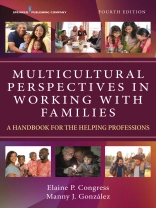Note to Readers: Publisher does not guarantee quality or access to any included digital components if book is purchased through a third-party seller.
Features a new intersectional approach to assessment and treatment and interweaves the perspectives of psychologists
Focusing on critical emerging issues in regard to multicultural families, the fourth edition of this popular book reflects fundamental issues surrounding assessment and treatment of families from diverse cultural backgrounds. The most effective treatment methods for working with culturally diverse families across the life cycle are covered in detail. Individual chapters focus on a variety of distinct ethnic groups including African American, Hispanic, Asian American, Native American, and Arab American, as well as the needs of LGBTQ multicultural families and the role of spirituality.
The text underlines the importance of an intersectional approach to working with families that, in addition to culture and ethnicity, also considers socioeconomic class, gender, age, religion, immigration status, and sexual orientation as important factors. Additionally, the text expands its direct-practice view with the addition of four new chapters written by psychologists, plus a new chapter on health issues in multicultural families and access to health services. The text is updated with the latest knowledge and research, along with new and revised case vignettes demonstrating culturally competent practice.
- NEW TO THE FOURTH EDITION:
- Provides a new intersectional approach to assessment and treatment
- Adds the perspectives of psychologists in four completely new chapters
- Includes a new chapter on DSM-5 from a multicultural perspective, plus new chapters on health and access to health services
- Offers the most up-to-date knowledge and research
- Provides new and updated case vignettes
- Reflects changes in the family unit over the last quarter century and how they impact treatment
- Addresses distinct sociopolitical issues affecting immigrants and undocumented families
- KEY FEATURES:
- Focuses on the most important emerging issues of multicultural families
- Covers multicultural mental health across the life span
- Encompasses the distinct perspectives of different ethnic and racial groups and those of LGBTQ families
- Discusses domestic violence and substance abuse in regard to multicultural families
- Delineates the most effective treatment methods
- Examines the culturagram as a useful assessment and treatment planning modality
- Addresses ethical issues including the NASW code of ethics
Daftar Isi
Contributors
Foreword
Preface
Acknowledgments
PART I: OVERVIEW
1. Using the Culturagram and an Intersectional Approach in Practice With Culturally Diverse Families
2. Practice With Multiracial Individuals and Families
3. Transracial Adoption and Transracial Socialization: Clinical Implications and Recommendations
4. The DSM-5 From a Multicultural Perspective
5. Evidence-Based Practice With Ethnically Diverse Clients
PART II: ADMINISTRATIVE AND LEGAL PERSPECTIVES
6. Managing Agencies for Multicultural Services
7. Legal Issues in Practice With Immigrants and Refugees
PART III: LIFE CYCLE PERSPECTIVES
8. The Multicultural Triangle of the Child, the Family, and the School: Culturally Competent Approaches
9. Cross-Cultural Perspectives on Working With Adolescents
10. Working With Culturally Diverse Older Adults
PART IV: PRACTICE WITH INDIVIDUALS AND FAMILIES FROM DIFFERENT RACIAL/ETHNIC BACKGROUNDS AND GENDER ORIENTATION
11. Practice With African American Families
12. Practice With Hispanic Individuals and Families
13. Practice With Asian Immigrant Families and Intergenerational Issues
14. Practice With Native American Families
15. Practice With Arab American Families
16. Practice With Lesbian, Gay, Bisexual, and Transgender People and Their Families
PART V: PHYSICAL AND MENTAL HEALTH ISSUES WITH MULTICULTURAL FAMILIES
17. Health Beliefs, Care, and Access of Individuals and Families From Diverse Backgrounds
18. Spirituality and Culturally Diverse Families: The Intersection of Culture, Religion, and Spirituality
19. HIV/AIDS and Latinx Families: Practice Considerations
20. Substance Abuse
21. Practice With Immigrant Victims of Domestic Violence
22. Culture, Intersectionality, and Suicide
PART VI ETHICAL ISSUES AND FUTURE DIRECTIONS
23. Ethical Issues and Future Directions
Index
Tentang Penulis
Manny John González, Ph D, is an associate professor and program coordinator of the doctoral program at the Phyllis and Harvey Sandler School of Social Work at Florida Atlantic University in Boca Raton, Florida.












